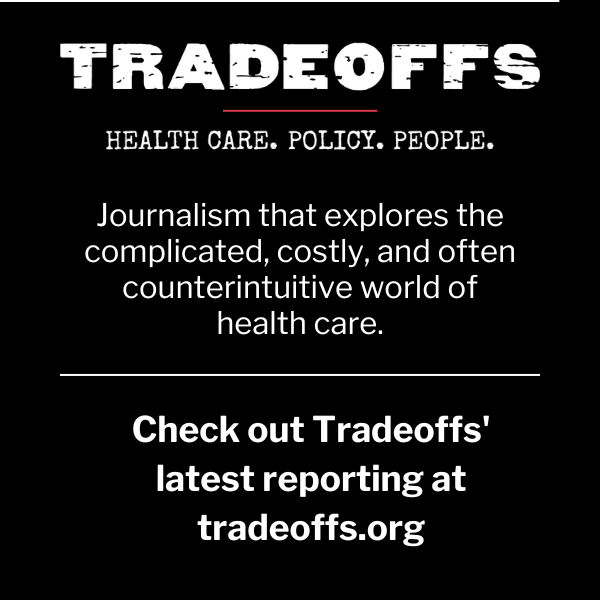Millions of Americans have begun taking drugs known as glucagon-like peptide-1 (GLP-1) agonists to lose weight; those numbers are expected to rise.
Shortly after Thanksgiving, Eli Lilly’s Zepbound (tirzepatide), which is used under the name Mounjaro for diabetes, is expected to follow Novo Nordisk’s Wegovy (semaglutide) as the second drug of this class to go on the market for weight management. More products are in the pipeline.
And physicians frequently prescribe Mounjaro or Novo Nordisk’s diabetes drug Ozempic (semaglutide) “off-label” for weight loss; nearly half of patients who took those drugs in 2022 lacked a history of diabetes, according to a report by data firm Trilliant Health.
As KFF Health News reported in April, widespread promotional campaigns for these pricey drugs have misled the public about their benefits and harms. Journalists have a heightened duty to combat misinformation and provide balanced coverage.
Here are five tips for tempering the hype.
Avoid the ‘miracle’ label
Be specific in your reporting about what these drugs can — and can’t — do.
For people with diabetes, GLP-1 agonists help to control blood sugar, and one also treats heart disease. A small study published in September found that Wegovy eases symptoms of a common form of heart failure.
Benefits for people without chronic disease are less clear. The FDA noted in approving Wegovy that being obese or overweight is associated with leading causes of death such as heart disease, stroke, diabetes and some types of cancer.
But so far, GLP-1 drugs have not been shown to extend life or prevent disease in people who are overweight or obese yet otherwise healthy — often the very people who are snapping up prescriptions.
Wegovy’s approval in 2021 stemmed from a 68-week placebo-controlled trial in which overweight adults lost an average of 14.9% of their body weight — an amount associated with reduced risk of heart disease.
According to Eli Lilly, people taking Mounjaro, which activates receptors for the hormone glucose-dependent insulinotropic polypeptide (GIP) in addition to GLP-1, lost an average 26% of their weight during an 88-week trial.
It’s unknown whether these drugs will keep weight off long-term, although weight does return if a person stops taking them. In the STEP 4 trial, participants used Wegovy for 20 weeks, after which they were randomized to either stay on the drug or switch to a placebo. After another 48 weeks, those who stopped the drug regained about 70% of what they’d lost.
Discuss harms
GLP-1 agonists are often touted as generally safe, but clinical trials that support FDA approvals don’t capture a complete picture of adverse events because of small sample sizes and brief follow-up.
Using outpatient prescription claims, Canadian investigators reported in a JAMA research letter last month that GLP-1 agonists are associated with increased risk of pancreatitis, gastroparesis, and bowel obstruction, although not biliary disease.
The researchers noted that those harms are rare. For example, of 1,000 people taking semaglutide for weight loss over one year, about nine get gastroparesis versus three using a comparable weight loss treatment.
Still, GLP-1 drugs presumably must be taken for a lifetime, which multiplies risk.
In recent months, European regulators have begun monitoring GLP-1 drugs for possible links to thyroid cancer.
News organizations have also cast a spotlight on potential problems. Reuters examined cases of suicidal thoughts and behavior, The New York Times covered potential for malnutrition and disordered eating, and the Associated Press reported that patients can inhale food and liquid into their lungs while under anesthesia for a medical procedure.
Manufacturers list safety concerns on their websites, and it’s important for news stories to acknowledge that even seemingly minor problems such as nausea and bowel changes can lower a person’s quality of life.
Beware of trial results reported in news releases
When companies report trial results, it’s critical to convey the quality of evidence and accurately portray findings. That doesn’t always happen.
For example, Novo Nordisk generated splashy headlines in August by announcing that Wegovy reduced the risk of cardiovascular events by 20%.
Many stories echoed a company news release and failed to convey key points, such as:
- The trial included only patients who already had heart disease.
- Detailed findings were not published in a peer-reviewed journal, making it difficult for independent experts to give an assessment.
- The 20% risk reduction was relative between the treatment group and the control groups, not absolute. For the public, relative risk can be misleading because it makes an effect seem larger than it actually is.
Mention alternatives
Drug makers promote the idea that obesity is a disease that requires medical treatment, and they’re on the side of patients. Novo Nordisk’s “It’s Bigger than Me” campaign employs Queen Latifah to tout “inclusive” medical care for people with obesity.
News coverage should acknowledge that not everyone agrees.

“There’s a whole cottage industry around co-opting anti-weight stigma language to sell diet drugs,” patient advocate Ragen Chastain said in an interview. Chastain writes the Weight and Healthcare newsletter and co-authored Health at Every Size guides for common medical conditions.
Chastain suggested journalists seek input from a growing number of physicians who practice “weight-neutral” care, in which patients are not pressured to lose weight on the grounds that it can lead to unhealthy loss-gain cycling and perpetuate weight stigma.
A story in Nature raised worries that GLP-1 drugs may “inadvertently reinforce the disputed link between excess weight and health.” It pointed out that many people who are considered obese are metabolically healthy, and obesity is not a top predictor of death.
“To pathologize a person’s health simply based on their body weight is potentially really, really harmful,” Sarah Nutter, a psychologist at the University of Victoria in Canada who specializes in weight stigma and body image, told the journal.
Disclose industry ties
Alarmingly, some mainstream news stories have quoted medical experts and advocacy groups such as the Obesity Action Coalition without mentioning their financial relationships with GLP-1 manufacturers, Chastain noted.
The public should “know that the experts being quoted are also being paid by the companies that they’re supporting in the media,” she said.
Ask sources about their financial ties, read their disclosures in journal articles and conference presentations, and plug their names into the government’s Open Payments database of drug and device industry payments. Keep in mind that even free meals can influence physician prescribing behaviors.
And of course, it’s critical to include independent voices. Georgetown University Medical Center’s PharmedOut project is a good place to start.
For an example of what not to do, consider CBS’s “60 Minutes,” which ran a cheerleading segment about Wegovy in January that granted air time exclusively to industry-funded medical experts.
The piece put such a shine on the blockbuster weight loss drug that the advocacy group Physicians Committee for Responsible Medicine accused the news program of engaging in unlawful advertising and called for a “corrective” ad.









